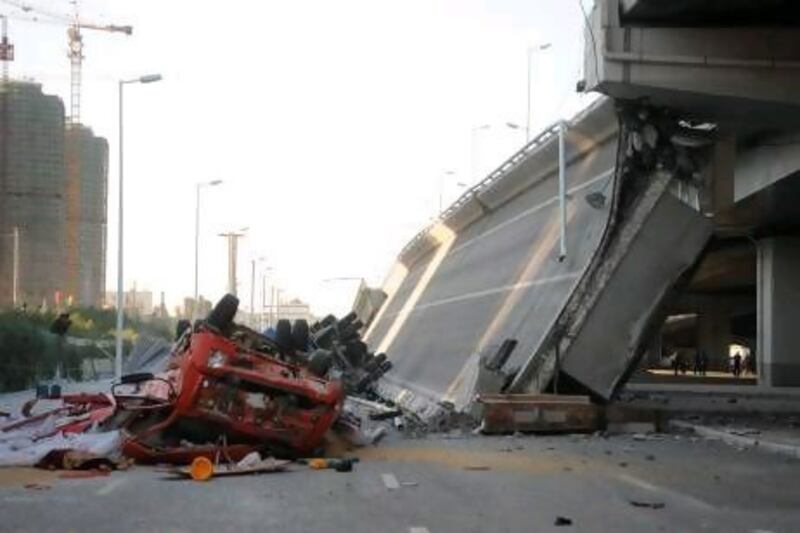BEIJING // When a nine-month-old, 1.88 billion yuan (Dh1.09bn) bridge in Harbin broke apart last week, killing three people and injuring five, one official was quick to blame overloaded lorries.
Yet in a country where at least six bridges have reportedly collapsed in little more than a year, some might find unconvincing the suggestion from Huang Yusheng that heavy goods vehicles, rather than the bridges themselves, might have been responsible.
China's infrastructure woes extend beyond fragile bridges. Streets have been caving in by the dozen after heavy rains. Even the state-run China Daily newspaper talked about "shoddy roads", as uproar continued on the country's microblogs.
In Shijiazhuang, a sprawling city of 10 million south of Beijing, the state media reported 80 roads had collapsed in the past two months. There have also been "soaring" numbers of pavements collapsing in the capital.
"The weird situation of pedestrians worrying about their safety is a great irony of a city's high-speed building boom," said Li Xun, the deputy head of the China Academy of Urban Planning and Design.
China is building infrastructure at unprecedented speed, linking its cities with motorways and high-speed railways as urban areas see populations grow by 13 million a year. A 4 trillion yuan stimulus programme from 2008, designed to maintain economic growth in the face of the global slump, has accelerated development.
But concerns over the quality of what has been built have increased.
"This is the national condition. I've seen a lot of people are now worried about their safety crossing bridges," Li Chengpeng, a Chinese commentator, wrote in a recent, widely reported blog post.
Sometimes, projects blatantly give the impression of having been completed in a hurry.
When the largest cross-sea bridge in the world, a 42.5 kilometre project linking the city of Qingdao with Huangdao district, opened on June 30 last year, the 90th anniversary of the founding of the Communist Party, photographs published in the state media clearly showed gaps in the crash barriers and loose or uncovered bolts.
In July, two people died when a mountain motorway in Yunnan province in south-west China collapsed two months after it opened.
That came almost exactly a year after a road in the same province broke apart the day after it opened for testing, also killing two people.
The railways, too, have come in for criticism, especially after a high-speed train accident in Zhejiang province, near Shanghai, in July last year killed 40 and left 191 injured.
According to Tsui Kai Yuen, a professor in the department of economics at the Chinese University of Hong Kong and a leading expert on China's infrastructure development, part of the problem is rushed work. China "wants to build Rome in a day", he said.
Another key issue is corruption. While there are building regulations, they are often flouted because developers and local authorities are in league with each other.
"The reality is often different from what's written on paper," said Mr Tsui. "That's the major problem -rampant corruption - and there's not sufficient accountability within the system.
"There is a lot of collusion between the developers or the contractors and the local government."
China's hierarchical system of administration, in which officials have economic growth targets to meet, promotes infrastructure development because this is one of the most effective ways to increase growth.
Yet accountability to the public is limited, so safety is often compromised.
The corruption extends to the highest levels. The country's former railways minister, Liu Zhijun, was sacked in February last year after allegedly taking 822 million yuan in kickbacks. He has since been expelled from the Communist Party and is facing criminal prosecution.
After Mr Liu was removed from office, the extent to which safety was potentially being compromised in a headlong rush towards development became apparent when his successor announced the speed of many trains was being reduced.
Ultimately, observers say the key problem - that corruption means rules are not enforced and officials and developers are not held responsible - is endemic. "There is not sufficient accountability within the system," said Mr Tsui.
[ dbardsley@@thenational.ae ]
Follow
The National
on
[ @TheNationalUAE ]
& Daniel Bardsley on
[ @DanielBardsley1 ]






